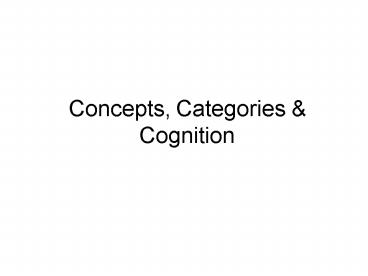Concepts, Categories - PowerPoint PPT Presentation
1 / 23
Title:
Concepts, Categories
Description:
How does experience with specific examples lead to the formation of a concept? ... German Shepherd. Rocking Chair. Need for Models of Cognition ... – PowerPoint PPT presentation
Number of Views:138
Avg rating:3.0/5.0
Title: Concepts, Categories
1
Concepts, Categories Cognition
2
What is a Concept?
- Examples
- Triangle
- Dog
- Justice
- A general idea, a class of objects
3
Issues in Concept Learning
- How does experience with specific examples lead
to the formation of a concept? - How is a concept represented?
- Ideal Form
- Prototype
- Exemplars
4
Types of Concepts
- Concepts can be defined by combinations of
attributes - A bird is a two-legged, feathered creature with
wings - A teenager is a youth between the ages of 13 and
19 - Concepts can be defined by similarities of
attributes
5
Attribute Combinations
- Simple Attribution
- Object is part of concept if it has Level A of
Attribute 1 - Male vs. female
6
Attribute Combinations
- Disjunction
- Object is part of concept if it has Level A of
Attribute 1 OR Level A of Attribute 2 (or both) - good casual eatery - pleasant atmosphere OR
very reasonable prices - Conjunction
- Object is part of concept if it has Level A of
Attribute 1 AND Level A of Attribute 2 - superior restaurant - good food AND good service
7
Attribute Combinations
- Bi-Conditional Concept
- Object is part of concept if it has Level A of
Attribute 1 AND Level A of Attribute 2 - OR
- It has Level B of Attribute 1 AND Level B of
Attribute 2 - Ex. Good car mechanic
8
ATTRIBUTIVE CONCEPT Circular Objects
9
ATTRIBUTIVE CONCEPT Blue Objects
10
DISJUNCTIVE CONCEPT Blue OR Circular Objects
11
CONJUNCTIVE CONCEPT Blue AND Circular Objects
12
Biconditional concept Blue AND Square OR Green
AND Circular
13
Concept Learning
- Hypothesis testing
- People formulate hypotheses about the concept and
test them with specific examples - Prototype Formation
- People develop a prototype of the concept from
seeing multiple examples - Exemplar Learning
- People simply learn about the specific examples
of their experience
14
Prototype Formation
- Difficult to study with simple geometric stimuli,
which have such discrete features - Michael Posner developed a random-dot prototype
to study the extraction of prototype information
15
Prototype
Exemplar 1
Exemplar 2
16
Exemplar Learning
- Implicit Learning through exposure to Exemplars
- How does one keep track of the specific details
of an experience? - The configural cue problem
17
How Would You Describe an A
- List of features
- left slanted line
- right slanted line
- short horizontal dash
- acute angle
18
How Would You Describe an A
- List of features
- left slanted line
- right slanted line
- short horizontal dash
- acute angle
19
The Problem of Faces
- What are the features of a face?
- How would you describe someone so they were not
confused with someone else?
20
A demonstration of how to change a face
http//www.stir.ac.uk/staff/psychology/pjbh1/facep
cas1.htm
21
Organization of Concepts
- Basic Level
- Dog
- Chair
- Superordinate Level
- Mammal
- Furniture
- Subordinate Level
- German Shepherd
- Rocking Chair
22
Need for Models of Cognition
- Empirical results are open to multiple
interpretations - In a model, all the details are put together in
one place
23
Types of Models
- Computational Models
- Simon Newell, GPS
- Neural Network Models
- McClelland Rumelhart, PDP
- Matrix Models
- Estes































